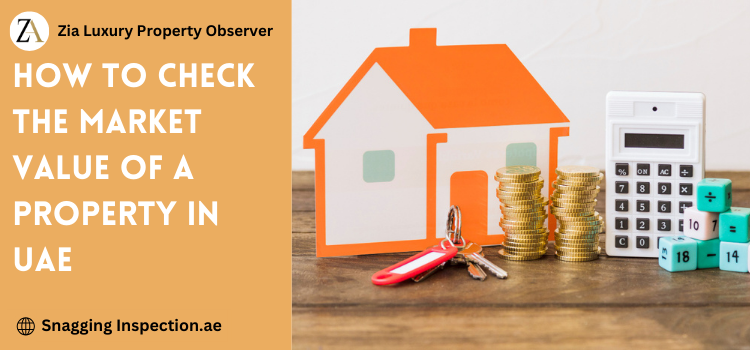When navigating the UAE’s bustling real estate market, understanding how to check the market value of a property is essential. Whether you are a homebuyer, homeowner, or real estate investor, knowing the property’s true value can help you make informed decisions. This comprehensive guide will walk you through the various aspects of determining a property’s market value, incorporating key entities such as fair market value, lot size, real estate agents, sale price, and more.
Understanding the Market Value Of A Property
What is Market Value?
Market value, also known as fair market value, is the estimated amount a property would sell for on the open market. This value is determined by what buyers are willing to pay and what sellers are willing to accept, considering various factors such as location, condition, and market conditions.
What is Fair Market Value (FMV)?
Fair Market Value (FMV) is a critical concept in real estate, representing the price that a property would sell for on the open market. FMV is established through the interaction of a willing buyer and a willing seller, both having reasonable knowledge of the property and acting in their best interests without undue pressure.
What is Fair Market Value Used for?
FMV is used in various aspects of real estate and finance, including:
- Property Sales: Establishing an accurate sale price.
- Tax Assessments: Calculating property taxes based on assessed value.
- Insurance: Determining insurance coverage and premiums.
- Mortgages: Assessing loan amounts based on the property’s value.
- Estate Planning: Valuing property for inheritance or sale purposes.
How to Calculate Fair Market Value?
Calculating FMV involves several steps, each requiring careful consideration of various factors to ensure accuracy. Here’s a detailed look into the process:
1. Comparative Market Analysis (CMA)
A Comparative Market Analysis (CMA) is one of the most commonly used methods to estimate FMV. It involves comparing the property in question to similar properties (comparables) that have recently sold in the same area.
How to Conduct a CMA For Property Value:
- Identify Comparable Properties: Look for properties that are similar in size, location, age, condition, and features. Ideally, these should be properties that have sold within the last six months.
- Analyze Sale Prices: Examine the sale prices of these comparable properties to get an idea of the market trends.
- Adjust for Differences: Make adjustments for any differences between your property and the comparables. For example, if your property has a larger lot size or additional amenities like a swimming pool, adjust the value accordingly.
- Market Trends: Consider the current market trends. If the market is rising, the FMV may be higher, whereas in a declining market, the FMV may be lower.
2. Professional Appraisal
Hiring a licensed appraiser to conduct a professional appraisal is another reliable method to determine FMV. Appraisers use various approaches to arrive at an accurate value, including:
How to Appraisal Determine Property Value:
- Inspection: The appraiser conducts a thorough inspection of the property, assessing its condition, size, and features.
- Sales Comparison Approach: Similar to a CMA, this approach compares the property with recently sold comparables in the area.
- Cost Approach: This approach estimates the cost to replace the property with a similar one, factoring in depreciation.
- Income Approach: Used primarily for rental properties, this approach estimates the property’s value based on its potential income generation.
3. Online Property Valuation Tools
Several online tools and websites like Property Makler provide property valuation estimates. These tools use algorithms and data points such as recent sales, tax assessments, and market trends to generate an estimated value.
Determine Property Value Using Online Valuation Tools:
- Input Property Details: Enter details about your property, such as location, size, condition, and features.
- Review Valuation Report: The tool generates a report with an estimated value and a breakdown of the factors considered.
- Cross-Verify: Use multiple tools to get a range of estimates and cross-verify with other methods like CMA and professional appraisal.
4. Review Tax Records and County Tax Assessor’s Information
Tax records and information from the county tax assessor can provide insights into the property’s assessed value. This value is often used to calculate property taxes but can also serve as an indicator of market value.
Steps in Reviewing Tax Records:
- Access Tax Records: Obtain the property’s tax records from the county tax assessor’s office or online portal.
- Analyze Assessed Value: Review the assessed value, which is typically a percentage of the FMV.
- Compare with Market Data: Compare the assessed value with recent market data and adjust for any discrepancies.
5. Consider Market Trends and Economic Indicators
Factors such as interest rates, employment rates, and economic growth play a role in determining FMV.
Considerable Market Trends for property cost assessment
- Monitor Economic Indicators: Keep track of key economic indicators such as GDP growth, unemployment rates, and interest rates.
- Stay Updated on Market Trends: Follow real estate market reports and news to understand current trends and future forecasts.
- Consult Real Estate Experts: Seek insights from real estate agents and market analysts who have a pulse on the market dynamics.
6. Consult a Real Estate Agent
A real estate agent’s expertise is invaluable in determining a property’s market value. Agents have access to comprehensive databases and possess in-depth knowledge of the housing market. They can provide a detailed market analysis and offer insights into current market trends.
Key Entities in Determining Market Value of a Property
1. Lot Size
Lot size significantly impacts a property’s market value. Larger lots often command higher prices, especially in areas where land is scarce. When evaluating a property’s market value, consider both the land area and the built-up space.
2. Sale Price vs. Asking Price
The sale price is the actual amount a property sells for, while the asking price is the initial price set by the seller. Understanding the difference between these two is crucial. The sale price often provides a more accurate reflection of the market value.
3. Property Condition and Features
A property’s condition and features, such as plumbing systems, modern kitchens, and energy-efficient windows, play a vital role in its market value. Properties in good condition with desirable features typically have higher market values.
4. Home Equity
Home equity is the difference between the property’s market value and any outstanding mortgage or loans. Higher home equity indicates a more valuable property and can influence its market value.
5. Amenities
Proximity to amenities such as shopping centers, parks, and public transportation can significantly affect a property’s market value. Properties near desirable amenities often have higher values due to increased demand.
6. Insurance Process
The insurance process can also impact a property’s market value. Insurers assess the risk and cost of insuring a property based on its value, location, and condition. Properties with higher market values may have higher insurance premiums.
Challenges and Mistakes When Assessing Fair Market Value
Common Challenges
Market Fluctuations
Market fluctuations can significantly impact property values. Rapid changes in the market can make it challenging to assess an accurate FMV. For example, a sudden increase in demand can inflate prices, while an economic downturn can lower values quickly.
Solution: Stay updated with the latest market trends and economic indicators. Regularly consult with real estate professionals and use up-to-date market data to make informed assessments.
Ignoring Property Condition
Failing to consider the actual condition of the property can lead to inaccurate valuations. Neglecting necessary repairs or upgrades can significantly affect the property’s value.
Solution: Conduct a thorough inspection of the property, noting any repairs or improvements needed. Consider hiring a professional inspector to provide an unbiased assessment of the property’s condition.
Common Mistakes
Not Accounting for Market Trends
Ignoring current trends can lead to outdated valuations. The real estate market is dynamic, with prices and demand fluctuating based on various factors such as economic conditions and seasonal trends.
Solution: Regularly update your market analysis to reflect current trends. Consult with real estate agents who have a pulse on the latest market movements and can provide timely insights.
Skipping Professional Appraisals
Relying solely on informal assessments without a professional appraisal can result in inaccurate valuations. Professional appraisers provide detailed and objective evaluations based on comprehensive criteria.
Solution: Invest in a professional appraisal, especially for high-value properties or significant financial decisions. A professional appraisal provides a reliable and precise value assessment.
When to Reassess Your Home’s Fair Market Value
Reassessing your home’s FMV is essential under certain conditions:
- Market Changes: Significant shifts in the housing market or economic conditions.
- Major Renovations: After making substantial improvements or upgrades to your property.
- Refinancing: When considering refinancing your mortgage to ensure you get the best rates.
- Selling: Before listing your property to set a competitive and realistic asking price.
Practical Tips for UAE Homebuyers
Understanding the UAE Housing Market
The UAE housing market is dynamic, with fluctuating prices and varying demand across different emirates. Staying informed about current market trends and understanding regional differences can help you make better decisions.
Working with Experienced Real Estate Agents
Partnering with experienced real estate agents who understand the local market is crucial. They can provide insights into property values, negotiate prices, and guide you through the buying process.
Considering Future Developments
When evaluating a property’s market value, consider future developments in the area. Planned infrastructure projects, new amenities, and upcoming commercial developments can enhance a property’s value over time.
Conclusion
Determining the market value of a property in the UAE is a multifaceted process that requires careful analysis and consideration of various factors. From conducting a Comparative Market Analysis (CMA) and obtaining a professional appraisal to utilizing online valuation tools and consulting with experienced real estate agents, each method provides valuable insights into a property’s fair market value.
Whether you are buying, selling, or refinancing, having a clear understanding of the market value of a property empowers you to make strategic and financially sound decisions. By leveraging the tools and insights provided in this guide, you can confidently approach the real estate market and achieve your property goals.

